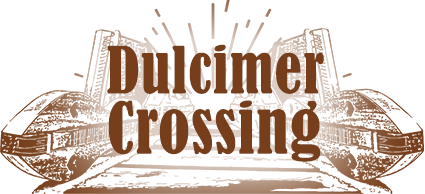Look, Mom! No Hands!
 Over the years, I’ve received several emails from folks who needed to take a break from practicing their instrument. For some, their living situation limits them due to quiet hours. Maybe they've slammed their finger in a door and can’t press the strings or hold the hammers until it heals. Some of you have mentioned arthritis or ongoing back issues. Other times, we can’t practice because our instrument is at the repair shop. Or maybe you’re on a trip and didn’t want to travel with your instrument on the plane.
Over the years, I’ve received several emails from folks who needed to take a break from practicing their instrument. For some, their living situation limits them due to quiet hours. Maybe they've slammed their finger in a door and can’t press the strings or hold the hammers until it heals. Some of you have mentioned arthritis or ongoing back issues. Other times, we can’t practice because our instrument is at the repair shop. Or maybe you’re on a trip and didn’t want to travel with your instrument on the plane.
Whatever the reason, there will be times when we want to practice but it’s just not possible at that time. Instead of focusing on the limitations of not being able to play an actual instrument, why don’t you keep some alternate strategies in your toolbox, so you can use the time away from your dulcimer productively. Here are my suggestions for practicing with NO hands.
- Research. Spend time planning the direction you want to take your repertoire. I like to look up the background of composers, review the history of tunes I might want to learn, check out songs in the genre I’m exploring. For example, this summer when I was focused on relearning my guitar chords, I printed a list of the top 100 country tunes and started looking up their chords.

- Listen and watch. Find recordings of songs you already know, to see if you could put a new spin on your own arrangement. Watch YouTube videos of some of your dulcimer heroes, for inspiration about the next tune to practice.
- Mark it up. Study your tabs or sheet music and write notes. Highlight sections where you need to tread carefully.
- Tap. You can tap your fingers on the table to master the rhythm of a difficult piece. When you don’t have to worry about which string to press or strike, you can focus more fully on the beat. I've also tapped my hammers on my mouse pad to work out a Calypso beat.
- Exercise. You’re probably thinking, “Are you joking? Exercise has nothing to do with playing a dulcimer!” Well, I say that a well-conditioned body helps keep your mind in good condition as well as your body. When your body is moving, you are circulating blood more, which transports oxygen and nutrients all the way to your brain. And playing an instrument is really mind over matter – your brain telling your fingers what to do and expecting them to obey.
- Practice mentally. I do a lot of my practicing in bed at night, or the early morning, when I can’t sleep but it’s “quiet time” in the house. I mentally visualize every strike of my hammer, note by note, and review where it’s going to hit. If I can’t remember where to go, I know that’s a section I should review when I get up.
Also, I do a lot of my arrangement composing the same way. I have usually performed the tune it in my head before I ever pick up my hammers to "polish" my mental scoring.
 Whatever the reason for not being able to connect with your dulcimer, by applying these suggestions you can always say, "Look, Mom! I'm practicing with NO HANDS!"
Whatever the reason for not being able to connect with your dulcimer, by applying these suggestions you can always say, "Look, Mom! I'm practicing with NO HANDS!"
Happy Dulcimering,
Linda
Categories
- News (8)
- Events (4)
- News (6)
- Events (4)
- subscriber news (233)
- mountain dulcimer (109)
- hammered dulcimer (112)
- uncategorized (6)
- lessons (189)
- mountain dulcimer (198)
- hammered dulcimer (154)
- history (22)
- music theory (40)
- octave (1)
- plagal cadence (1)
- dulci-bro (73)
- fingerpicking (3)
- fingerstyle mountain dulcimer (4)
- nina zanetti (4)
- aeolian (2)
- dorian (4)
- ionian (3)
- lydian (1)
- mixolydian (3)
- modes (2)
- traditional (2)
- tuning (4)
- music education (2)
- NSME (1)
- standards (1)
- drone (3)
- folk alliance (1)
- jonah brody (1)
- koto (1)
- chromatic mountain dulcimer (7)
- sam lee (1)
- scottish folk song (1)
- linda ratcliff (5)
- practice (26)
- chromatic mountain dulcimer (66)
- dulcimercrossing.com (2)
- erin rogers (7)
- building (8)
- black mountain (1)
- jerry read smith (1)
- Joshua Messick (1)
- song of the wood (1)
- don pedi (5)
- fiddle whamdiddle (9)
- miss mcleod (2)
- steve eulberg (30)
- vi wickam (9)
- buying (1)
- choosing (1)
- purchasing (1)
- orphan girl (1)
- copyright (1)
- amplification (2)
- contact pickup (1)
- eulberg (4)
- microphone (2)
- pickup (2)
- berkeley (1)
- colorado (2)
- festivals (4)
- kentucky (1)
- scholarship (1)
- western carolina (1)
- noter (2)
- clubfooted jib (1)
- dgd (2)
- dgd tuning (1)
- special event (31)
- david massengill (2)
- reverse ionian (1)
- chuck boody (1)
- concertina (1)
- deedee tibbits (1)
- dulcimer (7)
- evart (1)
- evart funfest (1)
- linda foley (1)
- michigan (1)
- original dulcimer players club (1)
- fingerstyle (11)
- gebhard woods (1)
- technique (1)
- harmonics (1)
- dan delancey (2)
- june apple (1)
- linda thomas (3)
- modal (1)
- expression (1)
- playing expressively (1)
- dulcimer pledge (1)
- christmas (2)
- nativity (1)
- DAC (2)
- minor more (1)
- mississippi sawyer (1)
- holiday (5)
- joy to the world (1)
- jingle bells (1)
- reverse ionion (1)
- hand independence (1)
- hand separation (1)
- lullabye of muffe (1)
- tina gugeler (1)
- absolute beginner mountain dulcimer (1)
- beginner (2)
- mountain (3)
- string-side up (1)
- absolute beginner hammered dulcimer (1)
- blog (2)
- dulcimercrossing. (1)
- topics (1)
- blues (4)
- resonator (4)
- dulcimer orchestra (2)
- kitty puss (1)
- mike clemmer (1)
- noter style (2)
- jam survival (7)
- butch ross (3)
- looping (1)
- intro (4)
- neal hellman (4)
- erin mae lewis (9)
- rehearsal (3)
- italian (1)
- lauda (1)
- irish (1)
- slipjig (1)
- rhythm (2)
- robert force (2)
- tuner (1)
- exercises (1)
- scales (1)
- devotions (3)
- hark advent (1)
- the glad sound! (1)
- chords (3)
- chromatic (4)
- erin (1)
- theory (7)
- advent (5)
- preparation (4)
- stir up (1)
- appalachia (4)
- hillbilly (1)
- mountains (1)
- traditional music (1)
- dampers (1)
- hearts of the dulcimer (3)
- patricia delich (2)
- wayne jiang (2)
- appalachian (1)
- John Jacob Niles (1)
- Live Events (28)
- Premium Level Membership (2)
- habits from the muse (1)
- progress (5)
- support (1)
- Anna Muckova (1)
- cimbalom (1)
- CWA (1)
- Czech Republic (1)
- Magdalena Muckova (1)
- nonsuch (1)
- Slovak Republic (1)
- podcast (1)
- aubrey atwater (2)
- jean ritchie (2)
- log-in (1)
- update (1)
- lucky (1)
- performance (8)
- preparing (1)
- study (1)
- dulcimers (1)
- wendy songe (2)
- bluegrass (2)
- growth (1)
- resolutions (2)
- risks (1)
- capo (1)
- snark (1)
- fiddle (61)
- criticism (2)
- judy klinkhammer (1)
- miles davis (2)
- wrong note (1)
- live and let live (1)
- style (1)
- barlow knife (1)
- old school old-time (2)
- marie kirby (1)
- bass mountain dulcimer (1)
- elaine conger (1)
- larry conger (1)
- practice smarter (5)
- musical journey (1)
- piano (1)
- calm (1)
- dog (1)
- su la li (1)
- bluebird cafe (1)
- inspiration (3)
- new input (2)
- trust (1)
- practice space (2)
- quite (1)
- how to practice (6)
- you are what you practice (1)
- workshop (5)
- rich chords (2)
- kaitlin pabo-eulberg (1)
- hooked on dulcimers (1)
- humor (1)
- blue water thinking (1)
- creativity (2)
- environment (2)
- original tunes (1)
- 1+ fret (1)
- chopin (1)
- classical (1)
- assessment (1)
- skill levels (1)
- waltz (1)
- caledonian club (1)
- ensemble (1)
- group (1)
- dulci-tune (1)
- tuning game (1)
- love (2)
- workout (1)
- learning (6)
- teacher (6)
- self-taught (1)
- how long (1)
- jam sessions (6)
- learn to play (1)
- strategies (2)
- fariña (1)
- mimi (1)
- pete seeger (2)
- rainbow quest (2)
- goals (1)
- planning (1)
- backing tracks (6)
- matthew dickerson (2)
- concert (1)
- erin mae (2)
- guitar (5)
- deborah hamouris (3)
- dj (2)
- freight and salvage (1)
- classic (1)
- licks (1)
- rock (1)
- berkeley dulcimer orchestra (1)
- premiere (1)
- banjo (1)
- frank proffitt (1)
- frank warner (1)
- tom dooley (1)
- baker (1)
- binding (1)
- blue lion (1)
- bob (1)
- gluing (1)
- janita (1)
- live (1)
- tips (1)
- spouse (1)
- amplified (1)
- DI box (1)
- digital interface (1)
- sound reinforcement (1)
- 2nd Set Concert (2)
- contest (1)
- flash mountain dulcimer brigade (2)
- JimJim & the FatBoys (1)
- Pecan Grove (1)
- walnut valley festival (2)
- winfield (1)
- wvfest (1)
- thinking (1)
- case (1)
- cross-legged (1)
- grip (1)
- safe dulcimer (1)
- sit (1)
- slip (1)
- stand (1)
- stool (1)
- strap (1)
- learn (3)
- mistakes (1)
- successes (2)
- herbie hancock (1)
- improvising (1)
- jazz (2)
- lois hornbostel (2)
- wrong chord (1)
- atlantic (1)
- barbara allen (1)
- frank profitt (1)
- scots-irish (1)
- chord wizard (1)
- diatonic (2)
- equi-distant (3)
- tom strothers (1)
- tool (1)
- busker (1)
- tsimbaly (1)
- ukraine (1)
- ukrainian (1)
- calendar (1)
- schedule (1)
- baritone (1)
- concert window (3)
- katie moritz (1)
- faq (1)
- frequently asked questions (1)
- logged in (1)
- navigation (1)
- old time (1)
- patreon (1)
- shape-note (1)
- special (1)
- carrell (1)
- geoff reeve-black (1)
- malvern (1)
- presnell (1)
- articulations (1)
- chicken reel (1)
- conger (1)
- soldier's joy (1)
- basic level membership (1)
- caring for your instrument (1)
- winter weather (1)
- god rest ye (1)
- rhythmic displacement (1)
- builder (1)
- tam kearney (1)
- toronto (1)
- don neuhauser (1)
- slide (1)
- ashley ernst (1)
- dan and angie landrum (1)
- dpn (1)
- dulcimer players news (1)
- dulcimersessions.com (1)
- maddie macneil (1)
- arkansas traveler (1)
- Mark Alan Wade (2)
- 3d playing (1)
- playing across the strings (2)
- chord symbols (1)
- understanding chords (3)
- dulcimer club (1)
- class (1)
- habits (1)
- skills (1)
- jimmy driftwood (1)
- failures (1)
- hours (1)
- youtube (1)
- arranging (1)
- bill robinson (1)
- cold winter night (1)
- karen mueller (3)
- jig (1)
- DAd tuning (1)
- hyfrydol (1)
- hymn (1)
- 2020 (1)
- premium (1)
- gounod (1)
- hitchcock (1)
- dan evans (1)
- spotted pony (2)
- steveeulberg (1)
- nylon-string (1)
- stephens lutherie (1)
- musical devotions (1)
- award (1)
- fernando sor (1)
- hammered (1)
- understanding (1)
- lent (1)
- leap forward (1)
- power of music (2)
- sharing (1)
- persistence (5)
- Practice (4)
- routine (1)
- tour (1)
- new website (1)
- arrranging (1)
- celtic (1)
- single jig (1)
- mountain dulcimer (3)
- busking (1)
- audio (1)
- playback (1)
- protection (1)
- adaptations (1)
- dulcimer acquisition syndrome (1)
- dulcimer acquisition disease (1)
- contests (1)
- lessons (1)
- identify (1)
- apps (1)
- motivation (1)
- hands (1)
- In Memoriam (1)
- guitar (1)
- archive (1)
- concerts (1)
- mountain dulcimer (2)
- hammered dulcimer (1)
- lessons (1)
- workshops (1)
- self-assessment (1)
- learn (1)
- greek (1)
- mindset (2)

0 comments
Leave a comment
Please log in or register to post a comment